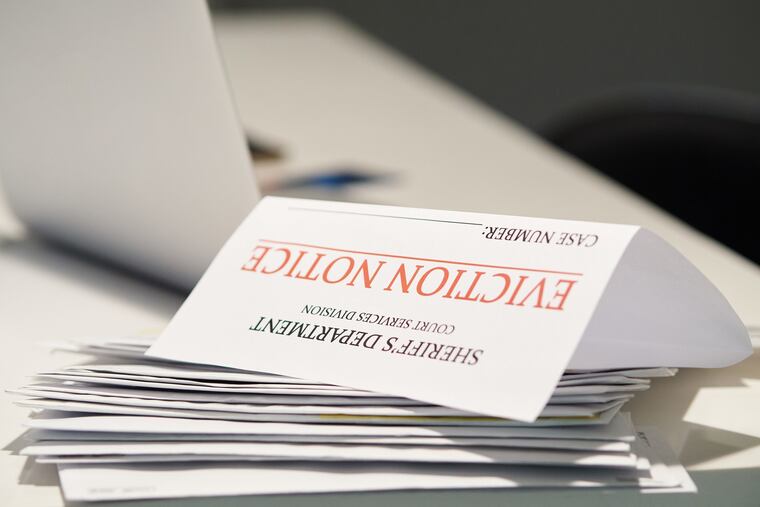Philly’s program for preventing evictions is a national model. Lawmakers want to make it permanent.
Without City Council action, Philadelphia's successful Eviction Diversion Program is set to end Dec. 31.

Philadelphia’s successful and nationally recognized Eviction Diversion Program, which compels landlords and tenants to ask for mediation and rental assistance before heading off to court, is set to expire at the end of the year, when a Pennsylvania Supreme Court emergency authorization ends. City Council members, housing advocates, renters, and landlords say the program should continue.
As the city aims to move toward a long-term solution for struggling tenants and landlords, members of Council are considering legislation that would authorize the city and courts to operate the Eviction Diversion Program for another year — until Dec. 31, 2022, with the caveat that rental assistance is available. If sufficient funds do not materialize, the city would adapt the program to focus on mediation between landlords and tenants to avoid evictions.
As of Dec. 3, the city received more than 76,000 applications from renters and landlords in the latest phase of its pandemic rental assistance program — far more requests than it can handle with current funding. The city recently received an additional $35 million for rental assistance, which officials estimate will get the program through the end of the month and maybe into early January.
Philadelphia is waiting to hear from the U.S. Treasury when and how much additional funding will arrive. The city has asked for an additional $485 million.
» READ MORE: Renters in parts of Pa. shut out of rent relief as counties elsewhere sit on millions in unused aid
Councilmember Helen Gym, who introduced the legislation, called extending the diversion program an “opportunity for us to show this country that Philadelphia can actually lead on real and meaningful solutions.”
“And as we turn the corner into 2022 and beyond, our commitment now is to a long-term process that is going to evolve but that recognizes that we’ve got a great program,” she said during a Council hearing Wednesday.
The housing committee unanimously approved the legislation and passed it on to the full Council.
Almost half of Philadelphia’s residents are renters. The city launched the diversion program in September 2020 to help tenants and landlords who had lost income because of the pandemic. Landlords must apply for rental assistance and participate in mediation with tenants at least 45 days before filing in court to evict tenants for nonpayment of rent. Officials said the program is a key reason that Philadelphia has been able to distribute more than $235 million in rental assistance.
City officials said the program has helped reduce the number of eviction filings by 75% compared with pre-pandemic levels, easing the landlord-tenant court’s caseload, helping landlords avoid vacancies and turnover costs, and preventing stains on tenants’ records that make finding future housing more difficult. Landlords and tenants in more than 90% of nearly 2,500 cases in the program have either reached agreements or are continuing to negotiate, according to the city.
» READ MORE: Philly Municipal Court halts evictions for some who have applied for rental assistance
Councilmember Maria Quiñones-Sánchez said the pandemic spurred the city to work with partners and engage the courts in a way it hadn’t before.
“The crisis created an opportunity, and we need to take advantage of that opportunity and make this something that is permanent, seamless, and protects small landlords as well as protecting the folks in this eviction process,” she said.
At Wednesday’s Council hearing, housing counselors, advocates, attorneys, tenants, and landlords endorsed the Eviction Diversion Program.
But landlords hope new iterations of the program can cut down on the time mediation takes — one of the biggest challenges for participating landlords, said Andre Del Valle, director of government affairs for the Pennsylvania Apartment Association. Mediation is usually scheduled within 30 days of a request. He said the success of the program also relies on distributing sufficient funds quickly.
Landlord-tenant court has relied on the program’s pre-filing requirement to manage its backlog of eviction cases. Without it, the wave of eviction filings would overwhelm the court, according to Patrick Dugan, president judge of Philadelphia Municipal Court, who wrote of the success of the program when he asked the Pennsylvania Supreme Court to extend its authorization through February.
“In essence, the anticipated ‘tidal wave’ of evictions has been successfully redirected to alternative dispute resolution utilizing federal funds and most of the cases have been resolved there,” Dugan wrote.
The high court has issued a series of short-term orders, the latest of which allows Philadelphia Municipal Court to continue the requirement that landlords use the program through Dec. 31. City Council needs to act for the program to continue long term.
» READ MORE: Philly’s Eviction Diversion Program shows some early success (From December 2020)
The Council legislation would require periodic evaluation of how the program is working for everyone involved.
The program is one of several protections in place for renters struggling during the pandemic. Tenants whose rental assistance applications have been marked “complete” by the city — meaning no further documentation is required — cannot be locked out of their homes over nonpayment of rent. This protection applies to applications submitted on or after July 1 and marked complete on or after Sept. 1.
Tenants can be locked out after more than 90 days following a landlord’s receipt of rental assistance.